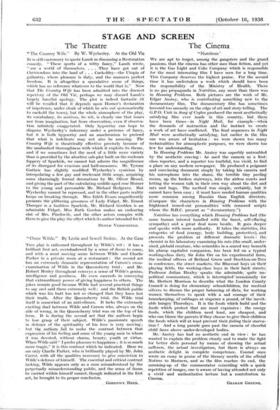"Oscar Wilde." By. Leslie and Sewell Stokes. At the Gate
Tms play is enlivened throughout by Wilde's wit ; it has a brilliant first act, overshadowed by a sense of doom to come, and with a most moving scene between Wilde and Charlie Parker in a private room at a restaurant ; the second act has an extremely dramatic representation of Carson's cross- examination of Wilde in the Queensberry trial ; and Mr. Robert Morley throughout conveys a sense of Wilde's genius, . intelligence and goodness. He even succeeds in conveying that extraordinary power of giving happiness to others. The jokes remain good because Wilde had several practical things to say and said them extremely well ; and the British public which was his butt has not so changed that they have lost their truth. After the Queensberry trial, the Wilde trial itself is 'somewhat of an anti-climax. It lacks the eXtremely exciting duel between Wilde and Carson who, always on the side of wrong, in the Queensberry trial was on the top of his form. It is . during the second act that the authors begin to lose grasp of their subject. Wilde's passionate speech in defence of the spirituality of his love is yery. moving ; but the author e fail , to make . the contrast between that expression of his feeling and-some of the young men to whom it was devoted, without charm, beauty, youth or Virtue. When Wilde said I prefer pleasure to happiness ; it is so much more tragic," it is this contrast which he indicated. Here we see only Charlie Parker, who is brilliantly played by Mr. John , Carrol, with all the qualities necessary to give conviction to Wilde's defence of himself. The essential and critical contrast lacking, Wilde appears only as a man misunderstood by the perpetually misunderstanding public, and the sense of doom he carried within himself cannot, though indicated in the first act, be brought to its proper conclusion.
Goaomwv.,REE.s‘ ,




















































 Previous page
Previous page